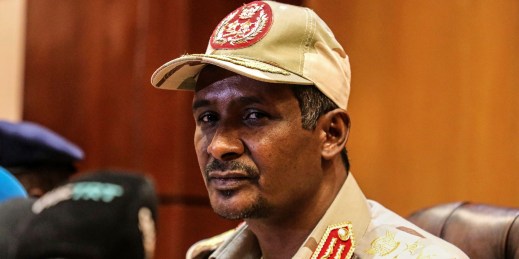Yesterday, the U.S. officially determined that the paramilitary Rapid Support Forces, or RSF, and its proxies are committing genocide as part of the civil war in Sudan, which broke out in April 2023 between the RSF and Sudanese government forces. The Treasury Department also issued sanctions targeting the RSF’s leader, Gen. Mohammad Hamdan Dagalo, as well as seven RSF-owned companies based in the UAE. (Reuters)
The civil war in Sudan has been raging for nearly two years, and while it is often inaccurately claimed to be ignored by the media—numerous outlets routinely report on the conflict—it has not elicited the same kinds of widespread popular engagement and calls to action in the West that other major conflicts, like the wars in Ukraine and Gaza, have.
Nevertheless, the impact on the civilian population has been just as horrific. The war has killed tens of thousands of people, driven much of the country into a widespread famine and forced more than 11 million people to flee their homes. There is strong evidence that both of the warring parties have committed war crimes. But the RSF has specifically been accused of targeting communities in Darfur based on ethnicity, killing civilians and committing sexual violence against women there. Evidence of those atrocities forms the basis of the U.S. determination of genocide.
It’s also notable that the U.S. is sanctioning companies based in the UAE, which has backed the RSF since the war started, in turn regionalizing the conflict and entangling its destabilizing effects with tensions in the Horn of Africa and rivalries in the Middle East. And yet, until yesterday, Abu Dhabi had largely avoided scrutiny or pressure from Washington for its involvement in the war.
The U.S. announcement now marks the first official determination of this nature by the international community related to the conflict. That is important symbolically, but it is also sure to put new scrutiny on the U.S. backing of Israel’s military campaign in Gaza. Yesterday, Ireland officially joined South Africa’s case at the International Court of Justice accusing Israel of committing genocide, which the court has already deemed “plausible.” And regardless of the outcome of that case, it is already clear that Israel has committed war crimes in Gaza.
Both conflicts speak to a larger issue: While human rights advocates often seek genocide determinations in hopes that the stigma of “the world’s worst crime” will change behavior on the ground, in practice they do little to stop actors from carrying out war crimes, motivate outside states to intervene or prevent genocidal atrocities from repeatedly occurring.
A former Cambodian opposition politician was shot and killed upon arriving in Bangkok yesterday. Thailand has become a magnet for Cambodian political dissidents, despite the fact that Bangkok has returned dissidents to Phnom Penh—where the Hun regime has recently ramped up its crackdown on the opposition—as recently as November.














